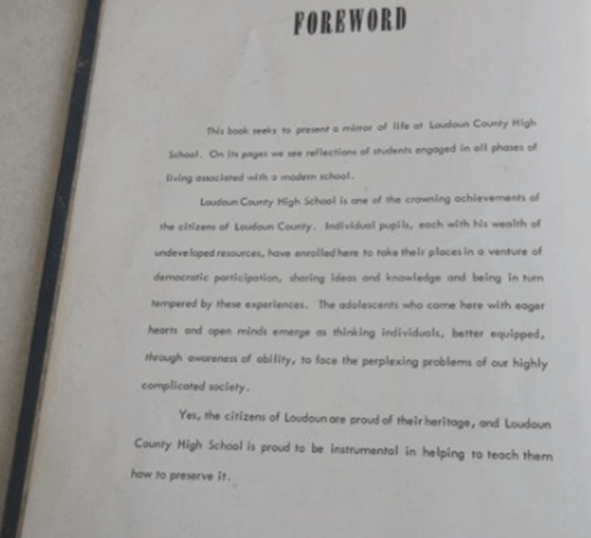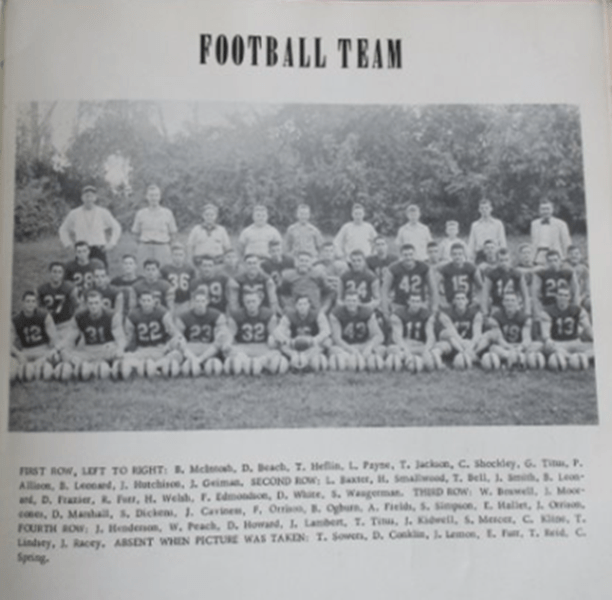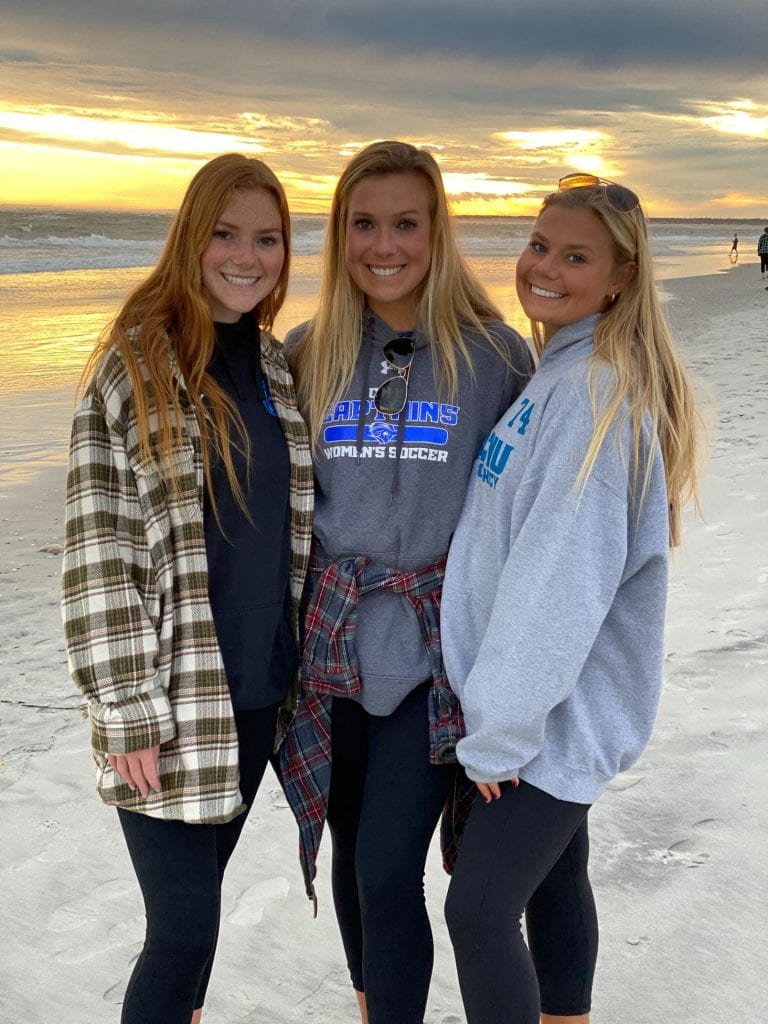Liberty Harrison | staff writer

This picture features a bird’s eye view shot of the school included in the 1956 LCHS yearbook. The school’s layout has changed considerably over the years, but features like the distinctive columned front entrance have stood the test of time, much like the school’s culture.
From its opening in 1954 to the present Loudoun County High School, the oldest of Loudoun County Public Schools, has experienced many changes. From its desegregation in 1968 to its many renovations over the years, to the integration of computers and other more advanced technology, LCHS students in 2021 have vastly different experiences compared to their counterparts in earlier decades.
One LCHS alumnus, Kenneth Peebles, who attended from 1969 to 1974, when LCHS ran from eight grade through 12th grade, shed light on the experiences of a student from his time. Many of his memories of LCHS will strike a chord with current students, while some of his reflections will seem unfamiliar and curious.
The academic side
One similarity is the time range of the school day. “I don’t remember the exact time, but the school day started at around 8:30 or 9:00 and ended around 3:00 or 3:30,” wrote Peebles.
However the way the school day was arranged is different. Instead of A and B days with four, ninety-minute classes each day as we have now, Mr. Peebles attended each of his classes every day, and each period would last about 50 minutes. Lunch was about 30 minutes, and there were four to five minute breaks between classes.
“I am pretty sure that we had six periods a day,” wrote Peebles. ”We went to the same classes at the same time each day.”
Another difference, not regulated by the school but by student convention, was the use of lockers. Whereas now the majority of LCHS students use their lockers sparingly (if at all) and instead bring their backpack to classes with the materials they need, Peebles experienced the opposite.
“Everyone that I remember used their locker between almost every period,” wrote Peebles. “I don’t remember anybody carrying a backpack. It was one of the scariest challenges of starting high school, trying to figure out how to get from one class to your locker and on to your next class on time. After a while it became second nature.”
The grading system has mostly stayed the same with a few minor changes.
“I think that it broke down something like this: 94-100 A, 88-93 B, 81-87 C, 76-81 D…” wrote Peebles. “The grading system was tough,” he said, echoing a sentiment that may have stayed the same over time as well.
A prodigious change the school went through over time was the introduction of computers for both student and teacher use.
“This is really going to date me but no work was related to computers,” wrote Peebles.
According to Peebles, during the 1970’s, large mainframe computers were in existence but almost exclusively used by large businesses and the government, mostly because they were the only organizations who could afford to use them at the time. Personal devices, including cell phones, laptops, tablets or even desktops were years away from invention, and the earliest iteration of the internet, far from what it looks like today, was created in 1983, four years after Peebles’ graduation.
School culture
Through his school career Peebles experienced several principals.
“There were three principals at LCHS during the five years that I was there,” he said. “Mr. Oliver Trumbo (SY69-70), Mr. Harry Bibb (SY70-71 and SY71-72) and Mr. Don Larson (SY72-73 and SY73-74). All were great administrators.”
Principal Larson was in fact LCHS principal for eight years in total, while our own Dr. Luttrell has been principal for almost seven years, since 2014.
Peebles also described his personal experiences with LCHS teachers during his high school years.
“I don’t remember having any bad memories regarding teachers,” wrote Peebles. “Obviously some were tougher than others but I doubt that has changed much. I had two teachers that still stand out to me. Lillian Bridges was my Algebra 1 teacher. She also taught my father when he went to high school at the old Leesburg school on North Street. She was tough but really cared about her students. The other teacher was Alan Smith. Mr. Smith was my Algebra 2 teacher and also the yearbook sponsor and a really good guy.”
In regards to LCHS’s extracurricular activities, Peebles made a valid guess about their evolution over the years.
“I would imagine that many of the extracurricular activities that were offered in the early 1970’s are still offered today,” Peebles wrote. “Most were clubs associated with student interests or community service, sports (although we didn’t have soccer, hockey, lacrosse or swimming), band, chorus, drama, yearbook and newspaper.”
However, although many clubs have stayed the same, Peebles’ personal experiences show that some activities within the clubs have changed dramatically.
“I was involved primarily in the Key Club and was a photographer briefly for the newspaper and moved to the yearbook staff my junior and senior year,” wrote Peebles. “It should be mentioned that this was pre digital photography. As a photographer you not only took the pictures, we had a dark room where we had to develop the film and print the photos using an enlarger.”
A close-knit community
As the community around Loudoun County has grown so has the population of LCHS, with 1,505 students in four grade levels, a large increase from the early 1970s.
“LCHS was a very small school community in the early 1970s,” wrote Peebles. “I think that there were only about 700 to 800 students spread across five grade levels.”
The smaller number of students at the school also affected the social climate of LCHS, but even as the population has grown the social structure has not greatly changed.
“Students knew most if not all of the kids in their own class and often knew a lot of kids in other grade levels that they met through student activities or siblings,” wrote Peebles. “There are probably students that would remember the existence of strong cliques, but I don’t remember it that way.”
According to Peebles, students would choose their friend groups based on numerous factors, including who they attended lower school levels with, lived near, or had similar interests and activities with. Even the groups that did exist Peebles remembered being fluid, and non-exclusionary.
“I remember that kids moved pretty easily from one group to another based on changes in interests or maybe even a new boyfriend or girlfriend,” wrote Peebles. “I don’t remember ever feeling excluded or feeling like anyone wanted to exclude any other student. If there were cliques most were built on shared experiences and times spent together.”
During his time at LCHS, Peebles had a friend group based on shared experiences.
“My friend group tended to be girls and guys that I had known for years and that I had shared many experiences with,” wrote Peebles. “They were the people that I was most comfortable with.”
Dating was another facet of social life at LCHS with some conventions slightly different from current norms.
“In general dating when I was in high school meant that you were ‘going steady.’ The norm was to have an exclusive girlfriend or boyfriend,” wrote Peebles. “These relationships were a big deal and probably comprised a large part of before and between class conversations…who was dating who, who broke up with who…”
Outside of school hours common activities were often still related to school, much like the football games or school dances of modern (pre-COVID) LCHS, with some minor differences.
“Leesburg and Loudoun County in general were pretty quiet places in the early 1970s. School provided a large part of the social activities for students,” wrote Peebles. “High school football and basketball games were always packed. Most home football games were followed by a dance. Even in the 1970’s these were still called ‘sock hops’. I think this was a holdover term from the 1950s and no, we didn’t take our shoes off. These dances were very informal…not like prom or homecoming but most did feature live bands.”
The school also organized more formal dances and other events throughout the school year, such as Homecoming activities (consisting of a parade, a dance and a bonfire), a winter/Christmas dance, a Sadie Hawkins dance and the Prom.
Most of the aforementioned events are still popular today, but several changes have taken place since the 1970s.
“An interesting fact related to homecoming…the student body selected the court each year but only varsity football players voted to select the queen,” wrote Peebles. “Homecoming dances were always held at the school in the gym (which is now the auxiliary gym) and the Prom was held at an offsite location…usually the clubhouse at the Goose Creek Country Club, which was destroyed by a fire quite a while ago.”
These events were often partially planned by the SCA, who also worked with school administration to address student concerns. Like LCHS’s current student government, the SCA consisted of a large group of students from every grade level.
Students and their larger world
When the school was not hosting an event over the weekend, students attended some of the entertainment locations still popular today, or participated in a distinctly dated activity.
“A movie at the Tally Ho, a party at a friend’s house or maybe even a road trip to the awesome ‘new’ mall at Tysons Corner,” wrote Peebles. “Most likely you would spend your evening in a car with a group of friends ‘cruising’ around Leesburg, stopping every once in a while when you came across another carload or two of friends just to talk. Pretty simple but we all liked it.”
One of the largest, most extensive changes between Peebles’ high school experience and the modern one is the complete lack of personal technological devices, and their social networking apps and sites.
“Without the internet or cell phones, social media as we know it today did not exist. Most communication was done face to face during the school day, at sporting events and other activities,” wrote Peebles. “Your home phone (landline) was also another way to communicate with your friends when not at school. This was pretty tough when you lived in a household with three or more other people and you only had one phone. Once you were off to college it was quite common to communicate with family and friends by writing letters. Things really have changed.”
According to Peebles the modern portrayal of slang in the 70’s is unrealistic. In fact the terms popularly used by students were closer to modern terms than what is depicted in media that imitates the 1970s.
“If you watch any movies or TV shows about the 70’s you would expect that we all walked around using terms like ‘right on’, ‘groovy’, ‘peace’ (this one came with its own sign),” wrote Peebles. “I don’t remember anyone using these terms, not on a regular basis anyway. It was a time for the rise of a couple of slang terms such as ‘dude’ and the use of ‘brother’ when greeting a close friend.”
Another part of student culture that, by the end of Peebles’ high school experience, reflected more modern norms was the LCHS dress code, and the fashions of the time it began to allow.
“During the five years that I spent at County there was a radical change regarding what was accepted as school attire,” wrote Peebles.
When Peebles began school neither shirts without collars nor jeans were allowed, and shorts were only allowed once a year, usually the last day of the school year labelled ‘Bermuda day.’ As he progressed through high school however standards changed.
“In addition to jeans becoming the basic element of fashion another popular trend with guys was Bass Weejun loafers with no socks and Chuck Taylor tennis shoes,” wrote Peebles. “I can’t really speak to girl’s fashion except to say that during this time pants, including jeans, became the standard as opposed to skirts and dresses.”
In Peebles’ experience the most popular music at the time was Motown and early 70’s Rock and Roll.
“Pretty classic stuff,” wrote Peebles.
In the last two decades many modern students have been affected to some extent by politics, from movements relating to recent school shootings to the two most recent presidential elections to the BLM movements. Students of the 1970’s also experienced several large political movements and controversies during their time in high school
“The two political events that dominated the news during my years in high school were the war in Vietnam and the Watergate scandal,” wrote Peebles. “Within the school I think that the war in Vietnam was of the greatest concern. It had been grinding on for so long and there didn’t seem to be an end in sight. I did not participate in any political or social movements at the time but I know that there were groups of students who were active in protesting the war and other issues.”
LCHS students not only protested the war, they were individually affected by it as well.
“Most of us knew someone that had gone,” wrote Peebles. “This was a time when the military draft was being used by the government to raise enough soldiers for the war effort and all male students had to register for the draft while they were still in high school…I think I remember that you had to register around your 17th birthday. It was not something that we talked about everyday but it was always in the back of your mind.”
The voice of experience
Even with the political turmoil at the time, Peebles experienced many benefits from his high school experience.
“I never have given much thought regarding the long term effects of attending LCHS,” wrote Peebles. “Looking back I would have to say that it was where I began to get my feet under me, where I first really began to build self confidence and a sense of accomplishment.”
Through his family and job Peebles has found ways to stay connected to the LCHS community.
“I have four nephews and a niece that graduated from Loudoun County,” wrote Peebles. “Both of my daughters graduated from LCHS. When they were there I had the chance to go back often to attend activities that they were involved in. I can see the lights from the football field and hear the marching band from my house if the wind is right. Every once in a while my wife and I will ride over to see a game. I often pass LCHS as I am driving through town and it always brings back great memories.”
He remembers his high school years fondly, and urges others to appreciate their time at LCHS.
“Take the time to cherish your years in high school,” wrote Peebles. “They are a unique period in your life.”























